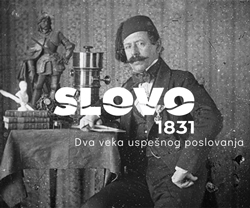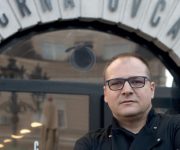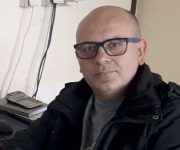George Bobwash, director of “TriGranit” considers that fundamental changes are made in the first and second week on taking over a company. When someone tries to change the rules in the third or eighteenth year after privatization – they lose credibility
The Budapest train which in 1968. arrived at one of Belgrade platforms has to a great extent determined the life of George Bobwash, now development director of the international corporation TriGranit – an integrated company for real-estate, construction and management investments. Because his father was a diplomat, this respectable Hungarian family resided in the Serbian capital until 1972. Thirty years later, in January 2002., George Bobwash, as the director of Beočin Cement Plant, which was bought by the French “Lafarge”, heads for Belgrade with his family with loaded suitcases and a one way ticket. The town from his childhood memories was unfortunately much different from what he had now come across.
– At the end of the sixties Serbia was a big and rich country. Those were the golden years when people travelled a lot and lived much better. For me it was a real shock when in the second half of the nineties, for the first time after all those years I stayed in Belgrade and saw traces of hard life. Instead of what I had in my head, an entirely different city welcomed me. The buildings that to me as a boy seemed huge suddenly became small. I remember staying at the “Hyatt” hotel. There were fifty waiters and I was the only guest – Bobwash remembers in the interview for Magazin Biznis, speaking in fluent Serbian and adds that he learned our language as a child out of curiosity, because he wanted to be “part of the team” and play basketball in the yard with his friends on an equal footing.
Business in seven languages
In the business biography of Doctor George Bobwash it also says that he speaks seven languages: Russian, Hungarian, English, Serbian, Slovenian, Czech and French. He commenced his career at the National Bank in Budapest in 1985. to transfer to City Bank in 1989. After only a few months his new workplace was in London. In Bank Austria in Vienna he worked from 1991. He also worked in Ljubljana, and from 1997. to 1998. he was in Belgrade. He occupied the position of the Director for Central and Eastern Europe in “Lafarge” in Paris from November 1998. until December 2001.
In the meantime, Bobwash was a witness of the country opening up for foreign investors, of the assassination of the Prime Minister, of the forming of new government… He has noticed many positive changes. However, he candidly admits that in winter 2002. his expectations were considerably higher.
– In the cement plant in Beočin we were hoping that foreign systems would be able to influence the surroundings and that the setting would change. We quickly realized that it was impossible to achieve that over night if there was a completely different world beyond the factory yard fence. Nothing obstructed our work in the company and in a short period of time we had made it into a western factory. In a way, we had expected a professional approach both in the municipality and on other levels of decision making. Unfortunately, there was a big discrepancy – stated Bobwash.
As he says, privatization is similar to relations in marriage. Fundamental changes are made in the first and second week of your life together. When someone tries to change the rules of the game in the third or eighteenth year – he loses credibility!
– The investor must adjust to local circumstances, and the surroundings must also accept the investor. Some investors do it better, some are less in tune with the surroundings, for you cannot build a successful company in the environment which is regressing.
George Bobwash has been on the position of the director of “Trigranit” from August 2006. Considering that construction development influences the development of many other branches of the economy, Bobwash has encountered businessmen of diverse profiles in his work.
He has noticed, he says, that there are two types of Serbian businessmen. The first is elegant, dynamic, and without exception has three mobile phones. They work all day but they themselves fail to understand the goals they have set.
Economy without alpha and omega
As a former banker who worked for a number of years in the City Bank, Bank Austria, but also in Erste Bank in Serbia (from October 2005. to July 2006.) Bobwash points out that it is very unfavourable that despite a huge turnaround in the banking system, not as much as 10 percent of that development has taken place in real economy.
– That is bad because all banks ultimately live on production. They only invest money. In the banking sector there is huge competition, but I do not see big domestic companies benefiting from all those changes in banking. As a client, I do not see that I have better conditions than those a few years ago, offers are more or less the same. It is significant that changes in real economy take place because production is the alpha and omega of economy.Steep prices and poor quality
When he describes Serbian construction, Bobwash says that it is to a greatest extent characterized by steep prices and poor quality. That is also seen, he emphasizes, when Belgrade is compared to cities of similar size, such as Budapest and Prague.
– The demand is high, but the supply is bad. It is not at all in the interest of some people that new objects be built in Belgrade. It often happens that an investor “blocks” a site and does nothing with it. Such people would not like foreign competition to come, because then they would have to approach construction in another way. They do not care about working more cheaply, but to maintain status quo and their quasimonopoly, that is, not to let anyone in this game so that they do not have to renounce extra profits- judges Bobwash.
The once strong Serbian construction enterprises, which were respected in the world as well, no longer keep abreast of the times. That is the same as when somebody “cut out a part of the film” and continued working according to old habits, while others have for a long time been doing business in accordance with other rules.
– The other type is businessmen with moustaches, who are much louder. However, those people always know what they want and have no perplexities. I have a greater liking for them because they reflect the way of life in these surroundings. They are not outsiders who do not know what is happening in their country – laughs Bobwash and adds that he has always argues with foreign colleagues who have no idea where they have come to live and what is happening in Serbia outside of Belgrade.
When speaking of potential investors, Bobwash, just as the majority of his colleagues, also mentions that our biggest problem is – a negative perception of the country. Serbia has, he explains, remained a country of a sufficiently high risk. That misconception can be changed only by positive examples. – A Lafarge does not mean anything. But a hundred such firms doing business in Serbia can do much. From the first day of my stay in Belgrade this country has been struggling with the same issues. These are Kosovo and Hague. More or less this is where the issue of risk ends for investors. The moment the investors know that these two things are past they will certainly come to Serbia in greater numbers. Both Kosovo and Hague represent a significant emotive, cultural, political and economic issue, but the political parties are not quite open when taking their stands, because they do not want to be unpopular with voters, George Bobwash holds.
He admits as well that in 2001, when investors started arriving in Serbia, none of them had expected that Bulgaria and Romania would be the first to enter the European Union. Now these two countries are in the company of EU countries, and Serbia still has no realistic chances of being there, concluded Bobwash and explained that it was partly due to the fact that the aforementioned questions had not been solved yet.
– If someone enters a club then he is not the one to be deciding on membership conditions. He will be told that by the club. Each country which became member of the European Union had that problem and all of them wanted to evade a request and make an exception. EU always insisted on the original conditions. It is rigid when it comes to its basic standpoints and that cannot be changed. However, it should also be explained that the first country members benefited from the European Union most. Membership does not bring former profit – Bobwash concluded.
Anica Nikolić
















